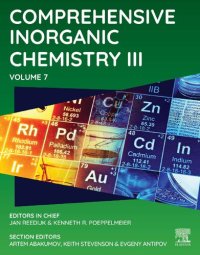
Ebook: Comprehensive Inorganic Chemistry III. Volume 7: Inorganic Electrochemistry
- Series: Comprehensive Inorganic Chemistry III
- Year: 2023
- Edition: 3
- Language: English
- pdf
Comprehensive Inorganic Chemistry III, a ten-volume reference work, is intended to cover fundamental principles, recent discoveries, and significant applications of elements and their compounds. Authored by renowned experts in the field and edited by a world-class editorial board, each chapter provides a thorough and in-depth overview of the topic covered, featuring resources which will be useful to students, researchers, faculty as well as those in the industry.
Comprehensive Inorganic Chemistry III focuses on main group chemistry, biological inorganic chemistry, solid state and materials chemistry, catalysis, and new developments in electrochemistry and photochemistry, as well as NMR and diffraction methods for studying inorganic compounds.
The work expands on our 2013 work Comprehensive Inorganic Chemistry II while also adding new volumes on cutting-edge research areas and techniques for studying inorganic compounds. Researchers seeking background information on a specific problem involving the synthesis of inorganic compounds, as well as applications for numerous elements from the periodic table, and their compounds, will be able to rely on and refer to this authoritative scientific resource time and again.
This volume bridges several fields across chemistry, physics and material science. Perhaps this topic is best associated with the book “Inorganic Electrochemistry: Theory, Practice and Applications” by Piero Zanello that was intended to introduce inorganic chemists to electrochemical methods for study of primarily molecular systems, including metallocenes, organometallic and coordination complexes, metal complexes of redox active
ligands, metal-carbonyl clusters, and proteins. The emphasis in this Volume of CIC III is on the impact of inorganic chemistry on the field of material science, which has opened the gateway for inorganic chemists to use more applied methods to the broad areas of electrochemical energy storage and conversion, electrocatalysis, electroanalysis, and electrosynthesis. In recognition of this decisive impact, the Nobel Prize in Chemistry of 2019 was awarded to John B. Goodenough, M. Stanley Whittingham, and Akira Yoshino for the development of the lithium-ion battery.
Comprehensive Inorganic Chemistry III focuses on main group chemistry, biological inorganic chemistry, solid state and materials chemistry, catalysis, and new developments in electrochemistry and photochemistry, as well as NMR and diffraction methods for studying inorganic compounds.
The work expands on our 2013 work Comprehensive Inorganic Chemistry II while also adding new volumes on cutting-edge research areas and techniques for studying inorganic compounds. Researchers seeking background information on a specific problem involving the synthesis of inorganic compounds, as well as applications for numerous elements from the periodic table, and their compounds, will be able to rely on and refer to this authoritative scientific resource time and again.
This volume bridges several fields across chemistry, physics and material science. Perhaps this topic is best associated with the book “Inorganic Electrochemistry: Theory, Practice and Applications” by Piero Zanello that was intended to introduce inorganic chemists to electrochemical methods for study of primarily molecular systems, including metallocenes, organometallic and coordination complexes, metal complexes of redox active
ligands, metal-carbonyl clusters, and proteins. The emphasis in this Volume of CIC III is on the impact of inorganic chemistry on the field of material science, which has opened the gateway for inorganic chemists to use more applied methods to the broad areas of electrochemical energy storage and conversion, electrocatalysis, electroanalysis, and electrosynthesis. In recognition of this decisive impact, the Nobel Prize in Chemistry of 2019 was awarded to John B. Goodenough, M. Stanley Whittingham, and Akira Yoshino for the development of the lithium-ion battery.
Download the book Comprehensive Inorganic Chemistry III. Volume 7: Inorganic Electrochemistry for free or read online
Continue reading on any device:

Last viewed books
Related books
{related-news}
Comments (0)